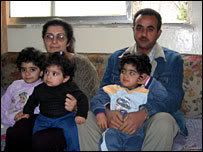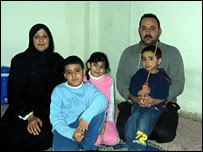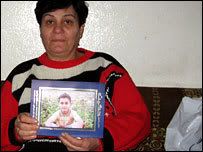The United Nations estimates two million Iraqis have fled to neighbouring countries to escape sectarian violence. It's estimated that 50,000 Iraqis flee the country every month. Many of them choose Syria and Jordan, where they often face extreme hardship. Their refugee status gives them no automatic benefits.
With help from the charity, Refugees International, the BBC spoke to four Iraqis about fleeing religious and professional persecution in their country:
FATIMA, DAMASCUS
Fatima is a single woman working as a hairdresser in Damascus.
She fled Baghdad three years ago after armed militants attacked the salon where she worked.
They disapproved of women having their hair cut in a public place.
They had also threatened to attack the building where she lived with several other women. The militiamen disapprove of women living alone.
"It's impossible to live as a single woman in Iraq; you are treated very badly and it's dangerous," says Fatima, a Shia Muslim.
She sold her jewellery to raise cash, and together with three other women, headed for Damascus.
"In Syria it's OK. Nobody interferes with my life if I just do my job and go home."
Fatima styles hair for women in their own homes; most of her customers are Iraqi. But she says her earnings barely cover the rent.
Every six months she has to leave Syria to renew her tourist visa. She hires a taxi to take her to the border.
"One taxi driver wanted to charge me 25,000 Syrian Lira (about US $480) for the journey. I said that was too much.
"He said that I must be making lots of money, that as an Iraqi woman in Syria, I must be working in a nightclub."
Some Iraqi women in Damascus have turned to prostitution to make ends meet.
"People judge me because of what they see in clubs in Syria, they assume every Iraqi woman is doing the same thing."
Fatima has no family to help her out so she feels isolated - especially in a society which is sceptical of single women.
"I want to be independent. I don't want to be judged badly; I don't want to be humiliated by anything.
"I just want to feel settled and to know I can survive."
KHALIL AND DALAL, DAMASCUS
Only Dalal agreed to be photographed. Khalil, a painter, was afraid the people who attacked him would find out he is now in Syria.
In 2004 he began to receive anonymous threats from someone who objected to his painting of a woman, calling it blasphemous.
He was also threatened because he had been asked to paint portraits for American troops in Baghdad.
Three weeks after the first threat, his gallery was burned to the ground. Shortly afterwards, someone threw a firebomb into the couple's living room in the middle of the night, while they slept upstairs.
It took them two months to raise the money to leave.
The couple have three grown up children. Their youngest son lives with them and their daughter lives in Canada.
Their oldest son, Ziad, lives in Sweden. He was visiting his parents for the first time in five years and explained, from Damascus, their situation:
"They can't work and they don't have much money. They have a little from what they brought over from Iraq, but there's not much left because they have to pay for their food and rent out of it."
The couple know a few Iraqi families in Damascus and Ziad says his 19-year-old brother plays football in the street with some Iraqi friends.
But, he says his mother misses having her wider family around her and "feels lonely inside".
The couple appear to have taken on the informal role of community activists in Damascus. Khalil teaches art at the local church and Dalal helps orient new arrivals from Iraq to life in Syria.
Ziad says his parents cannot return to Iraq and are trying to move either to Canada, or Sweden, to join one of their other children.
AHMED and MAYYADA ABDEL SALAM, AMMAN

Ahmed is a doctor and his wife Mayyada is a pharmacist. They belong to the Sabian faith, a monotheistic non-Muslim minority in Iraq.
They left Baghdad in 2005 after Mayyada's pharmacy was attacked when she refused to wear a headscarf.
Ahmed explains: "One of the radical Muslims came into the pharmacy and asked Mayyada why she was unveiled. She explained she was not Muslim and that there was no hijab in her religion.
"He told her she was an infidel and that she should leave Iraq."
A few days later the radicals targeted the pharmacy in a drive-by shooting. Ahmed says they had a lucky escape.
"I, my wife and children were in the pharmacy when the attack happened. They shot several rounds, smashing the shop window and the shelves of drugs.
"We were terrified. My wife was injured in the leg, but only superficially."
The family didn't return to the pharmacy, but stayed at home preparing to leave Iraq.
They arrived in Jordan less than two months later. Ahmed says they chose Jordan because it was close and at the time it was easy to get to.
But life is difficult in Amman.
"We arrived as refugees; we have no rights. We can't work and we can't send the children to school. We have three daughters, aged six, three and one. We are considered illegal residents in Amman, although we are refugees."
They arrived with their life savings which Ahmed reckons will last another four or five months. After that, they will have to ask for help from relatives abroad.
Ahmed's parents are living in their family home in Baghdad.
"We speak to them on the phone, we are very anxious about them because it is so dangerous."
They family is renting a two-bedroom apartment in Amman and educating their six-year-old at home.
They are in touch with other Iraqis in the city and they also know a few Jordanians.
"We do have some contact with them, but it's usually superficial. There's no time for anything deeper and we are not in the right frame of mind to reach out to others.
"We keep it superficial because we are depressed and we don't know what the future holds."
Ahmed and his wife want to move to Australia. They have already had one application rejected, but they are putting in another.
"We want to start a new life for our children. They are more important than us."
SAAD MOHAMED AND FAMILY, AMMAN

Saad brought his family to Jordan in June 2006, after narrowly escaping two direct attempts on his life.
Under Saddam's regime Saad, a Sunni, was a soldier in the army and his ID card identifies him as a veteran of the Iran-Iraq war. He is therefore considered a "Saddamist".
"I received letters at my house, telling me to leave within 24 hours or be killed.
"One time, I was driving the car - with our three young children - and somebody started shooting at us. I managed to drive away quickly and we escaped. That was in Baghdad."
The family fled with no possessions. They had money sent from home after they arrived in Amman - but it was stolen within 24 hours.
Saad believes someone followed them from Iraq and stole the money as soon as it was safe to do so.
He has no work permit and was unemployed for the first five months in Jordan.
"About three weeks ago someone gave me a job. I'm working as a porter, guarding a building. The pay barely covers the rent, food and water. It's hardly enough to live on."
After Saddam's regime was toppled, Saad used to work in a shop, selling electric cables and lighting equipment.
He has no friends or family in Jordan. He says he chose Amman because it was the only place he could escape to.
"Our children are aged seven, six and four. They need to go to school, but I can't afford to send them."
Saad is applying for asylum in Europe. He says he has contacted the Spanish embassy, but he hasn't heard from them yet.
One of his children was born with a disability and has already had several operations. Saad has applied to children's organisations to see if his son can be offered a place in school.
He says he has no idea what happened to his house in Baghdad.
"All I know is that the Mehdi Army have now got hold of many houses in the area where I used to live."
Would he ever think of going back?
"I don't even think about it. It's highly unlikely. I have a psychological block about it.
"Five of my cousins were killed in front of my eyes immediately before I left."
Saad says he conjures up the memory of Iraq to try to get his children to behave: "If they're playing up, I threaten them with moving back to Iraq."
